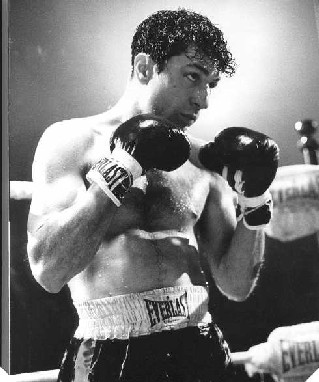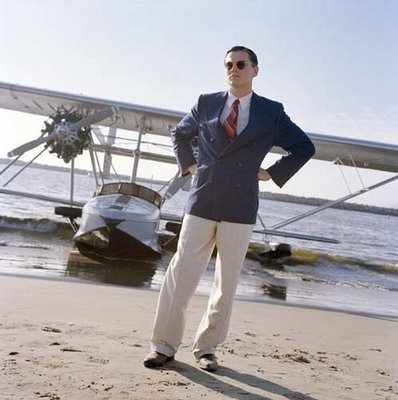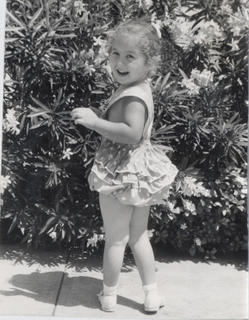Monday, September 11, 2006
My Scorsese Rage

MY SCORSESE RAGE
Do you know what I feel The Aviator's precursor to have been? Scorsese's (of course) Raging Bull. We've seen DeNiro in, primarily, weighty--yet not meaty--roles in recent years. Or else, he's a wonderful "heavy" to the likes of Billy Crystal and Ben Stiller. Raging Bull is something else: it's a documentary...within a movie...within a documentary (or at least that's the way I interpreted it). Chock-full of blood, guts, and hubris--a la Othello (I credit the Wikipedia article with this analysis), it is, nonetheless, a tale of redemption. No wonder DeNiro won his Oscar for his portrayal of Jake LaMotta (who, incidentally, had a club in Miami during the mid-1950's). (And then LaMotta turned around and sued Scorsese.) I was riveted and fascinated, and I could see how filmmakers have been infuenced by "the Scorsese touch": attention to detail; creative cinematography; special use of slow-motion effects. The movie derives its power in no small measure from the fact that it was filmed in black and white (except for a brief--and totally "happy"--sequence). Where--and how--does this tie in to The Aviator? Another tale of hubris and redemption, albeit as lush in its color as Raging Bull was stark in its black and white. Another biopic from a great master of the genre. Raging Bull is generally considered to be Martin Scorsese's masterpiece. I'm still digesting it, even though it took me twenty-six years to find it.
The Aviator: In this, the year of at least two other great biopics (Ray, Kinsey), Martin Scorsese's latest is sure to be a contender in the Globe/Oscar race. Leonardo DiCaprio grows into his role as Howard Hughes, from daring young mega-entrepreneur, through his middle age, by which time he was both engrossed with and battling his inner demons, and subtly, yet definitively, hints at the darkness that would ultimately engulf this brilliantly eccentric man toward the end of his life. Simply put, Howard Hughes was a visionary. He was a multifaceted genius with many talents, and many passions. His greatest passion, however, was to fly. DiCaprio captures this spirit, and embodies it more and more strongly as the movie progresses: by the end, I felt as if it were Hughes on the screen. The rest of the cast was also superb, especially Cate Blanchett as Katharine Hepburn, the great love of Hughes' life, complete with Miss Hepburn's flippancy, New England reserve, and, yes, that Connecticut twang. The lovely Kate Beckinsale, as Ava Gardner, provides the other female interest. The scenes with Blanchett and Beckinsale, notwithstanding, Scorsese does not let us forget that Hughes was a man's man, too: DiCaprio's interactions with the great character actor, John C. Reilly, as Hughes' business manager, Noah Dietrich; with Alec Baldwin, as Hughes' competitor, Pan American founder Juan Trippe; and with Alan Alda, as the insatiably greedy Senator Ralph Owen Brewster, are rife with emotion, both poignant and riveting at the same time. The Senate hearing showdown between Hughes and Brewster toward the end is downright bombastic: it was by this point that DiCaprio had me totally convinced. Although Hepburn never fully leaves him, and Gardner lends a helping hand at a point when he sorely needs it, Hughes is, at the end, surrounded by only a tiny group of fiercely protective employees. His impending solitude, at the end, is palpable. This projection into the future is augured by so many obvious -- yet subtle -- signs, that you don't mind when Scorsese brings the (two and a half hour) movie to a halt: Howard's back with his mom. He makes three predictions about his future. They all come true. It takes a very special individual for this to happen. Leonardo DiCaprio captured Howard Hughes' fire, his intense zeal for life. It's going to be a tough call come February, but I feel Leo will be a strong contender. (He won the Golden Globe for Best Actor in a Drama for 2004.)
Above all else: Scorsese stressed Hughes' passion for aviation. Remember trips to Europe in the '60's: New York/Newfoundland/Ireland/Paris? Think TWA. Thank Howard Hughes.
--My Aviator review originally appeared in the end of December, 2004 issue of Seaside Scoop; Peggy Fisher, Editor.

Georgina Marrero
Monday, September 11, 2006
In remembrance of a good that was a good before it became a bad.
